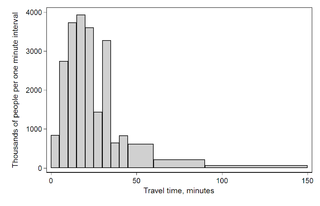Related Research Articles
Psychological statistics is application of formulas, theorems, numbers and laws to psychology. Statistical Methods for psychology include development and application statistical theory and methods for modeling psychological data. These methods include psychometrics, Factor analysis, Experimental Designs, and Multivariate Behavioral Research. The article also discusses journals in the same field.
The theory of statistics provides a basis for the whole range of techniques, in both study design and data analysis, that are used within applications of statistics. The theory covers approaches to statistical-decision problems and to statistical inference, and the actions and deductions that satisfy the basic principles stated for these different approaches. Within a given approach, statistical theory gives ways of comparing statistical procedures; it can find a best possible procedure within a given context for given statistical problems, or can provide guidance on the choice between alternative procedures.
In statistical hypothesis testing, a result has statistical significance when it is very unlikely to have occurred given the null hypothesis. More precisely, a study's defined significance level, denoted by , is the probability of the study rejecting the null hypothesis, given that the null hypothesis was assumed to be true; and the p-value of a result, , is the probability of obtaining a result at least as extreme, given that the null hypothesis is true. The result is statistically significant, by the standards of the study, when . The significance level for a study is chosen before data collection, and is typically set to 5% or much lower—depending on the field of study.

SPSS Statistics is a software package used for interactive, or batched, statistical analysis. Long produced by SPSS Inc., it was acquired by IBM in 2009. Current versions have the brand name: IBM SPSS Statistics.

Minitab is a statistics package developed at the Pennsylvania State University by researchers Barbara F. Ryan, Thomas A. Ryan, Jr., and Brian L. Joiner in 1972. It began as a light version of OMNITAB 80, a statistical analysis program by NIST. Statistical analysis software such as Minitab automates calculations and the creation of graphs, allowing the user to focus more on the analysis of data and the interpretation of results. It is compatible with other Minitab, LLC software.
EViews is a statistical package for Windows, used mainly for time-series oriented econometric analysis. It is developed by Quantitative Micro Software (QMS), now a part of IHS. Version 1.0 was released in March 1994, and replaced MicroTSP. The TSP software and programming language had been originally developed by Robert Hall in 1965. The current version of EViews is 12, released in November 2020.

Androphilia and gynephilia are terms used in behavioral science to describe sexual orientation, as an alternative to a gender binary homosexual and heterosexual conceptualization. Androphilia describes sexual attraction to men or masculinity; gynephilia describes the sexual attraction to women or femininity. Ambiphilia describes the combination of both androphilia and gynephilia in a given individual, or bisexuality.

In statistics the frequency of an event is the number of times the observation occurred/recorded in an experiment or study. These frequencies are often graphically represented in histograms.
David Victor Canter is a psychologist. He began his career as an architectural psychologist studying the interactions between people and buildings, publishing and providing consultancy on the designs of offices, schools, prisons, housing and other building forms as well as exploring how people made sense of the large scale environment, notably cities. He set up the Journal of Environmental Psychology in 1980. His work in architecture led to studies of human reactions in fires and other emergencies. He wrote about investigative psychology in Britain. He helped police in 1985 on the Railway Rapist case. He was the professor of psychology at the University of Surrey for ten years, where he developed investigative psychology described in detail in Investigative Psychology: Offender Profiling and the Analysis of Criminal Action and a course curriculum. He set up and was director of the Centre For Investigative Psychology, which is based at the University of Liverpool. From 2009 he was at the University of Huddersfield, where he directed the International Research Centre in Investigative Psychology. He retired from there in 2018. He is emeritus professor at the University of Liverpool and continues to publish in environmental and crime/forensic psychology.
Engineering psychology, also known as Human Factors Engineering, is the science of human behavior and capability, applied to the design and operation of systems and technology. As an applied field of psychology and an interdisciplinary part of ergonomics, it aims to improve the relationships between people and machines by redesigning equipment, interactions, or the environment in which they take place. The work of an engineering psychologist is often described as making the relationship more "user-friendly."

Forensic geology is the study of evidence relating to minerals, oil, petroleum, and other materials found in the Earth, used to answer questions raised by the legal system.
Daniel Merton Wegner was an American social psychologist. He was a professor of psychology at Harvard University and a fellow of both the American Association for the Advancement of Science and the American Academy of Arts and Sciences. He was known for applying experimental psychology to the topics of mental control and conscious will, and for originating the study of transactive memory and action identification. In The Illusion of Conscious Will and other works, he argued that the human sense of free will is an illusion.
Alan Brian Carter is Emeritus Professor of Moral Philosophy at the University of Glasgow.
Robyn Mason Dawes was an American psychologist who specialized in the field of human judgment. His research interests included human irrationality, human cooperation, intuitive expertise, and the United States AIDS policy. He applied linear models to human decision making, including models with equal weights, a method known as unit-weighted regression. He co-wrote an early textbook on mathematical psychology.
Repeated measures design is a research design that involves multiple measures of the same variable taken on the same or matched subjects either under different conditions or over two or more time periods. For instance, repeated measurements are collected in a longitudinal study in which change over time is assessed.
Irving B. Weiner is an American psychologist and past president of Division 12 of the American Psychological Association. and past president of the Society for Personality Assessment. He is the author and editor of many books on psychology.
Ronald F. Levant is a psychologist and a former president of the American Psychological Association (APA). After earning an undergraduate degree at the University of California, Berkeley, Levant completed a Doctor of Education (EdD) at Harvard University. He also holds a Master of Business Administration (MBA) from Boston University.

JASP is a free and open-source program for statistical analysis supported by the University of Amsterdam. It is designed to be easy to use, and familiar to users of SPSS. It offers standard analysis procedures in both their classical and Bayesian form. JASP generally produces APA style results tables and plots to ease publication. It promotes open science by integration with the Open Science Framework and reproducibility by integrating the analysis settings into the results. The development of JASP is financially supported by several universities and research funds.
Wolfram Meier-Augenstein is a Professor at Robert Gordon University, Aberdeen, a registered forensic expert advisor with the British National Crime Agency and a member of the Advisory Board of the journal Rapid Communications in Mass Spectrometry. He holds a doctorate in natural sciences awarded by the Ruprechts-Karl University Heidelberg (Germany) in 1989. The subject of PhD thesis was the structure/activity relationship of stereo-isomers of the Periodic Leaf Movement Factor 1 that triggers the nastic leaf movement of Mimosa pudica L. As Feodor-Lynen-Fellow of the Alexander-von-Humboldt Foundation and PD Fellow of the South African Research Foundation he spent 1.5 years as post-doctoral fellow with Prof. B.V. Burger at the University of Stellenbosch. Here he synthesised and studied cyclodextrine derivatives used as chiral selectors for enantioselective gas chromatography. From there, his career took him to the University Children’s Hospital Heidelberg, the University of California San Diego, the University of Dundee, the Queen’s University Belfast and back to Scotland, first to the James Hutton Institute (Dundee) and finally the Robert Gordon University (Aberdeen). From 2010 to 2014 he served as Director of the Forensic Isotope Ratio Mass Spectrometry Network (FIRMS). while from 2009 to 2013 he was a Council member of the British Association for Human Identification (BAHID). Dr Meier-Augenstein was one of the scientists consulted by the Garda Síochána investigating the case of the dismembered torso found in the Dublin Royal Canal. This case has gained some notoriety under the name Scissor Sisters. He was also one of the scientists consulted by the police investigating the Norfolk headless body case. Most recently, Dr Meier-Augenstein was involved with the case dubbed "The Lady of the Hills" or the "Thai Bride". His interpretation of stable isotope signatures obtained from remains of the murder victim corroborated one line of investigation that the victim might have grown up in Thailand. A subsequently launched public appeal received a response from a Thai family who believed the victim could be their daughter. DNA tests finally confirmed the identity of the victim as Lamduan Armitage, nee Seekanya, originally from Thailand who had moved to the UK in 1991. Dr Meier-Augenstein is the author of the book "Stable Isotope Forensics", the first textbook dedicated to principles and forensic applications of stable isotope analytical techniques.
References
- ↑ Davies, Graham (November 29, 2002). Interested in a life of crime? Times Higher Education
- ↑ Barry, Ellen (February 14, 2002). Despite therapies, pedophilia eludes cure. Boston Globe